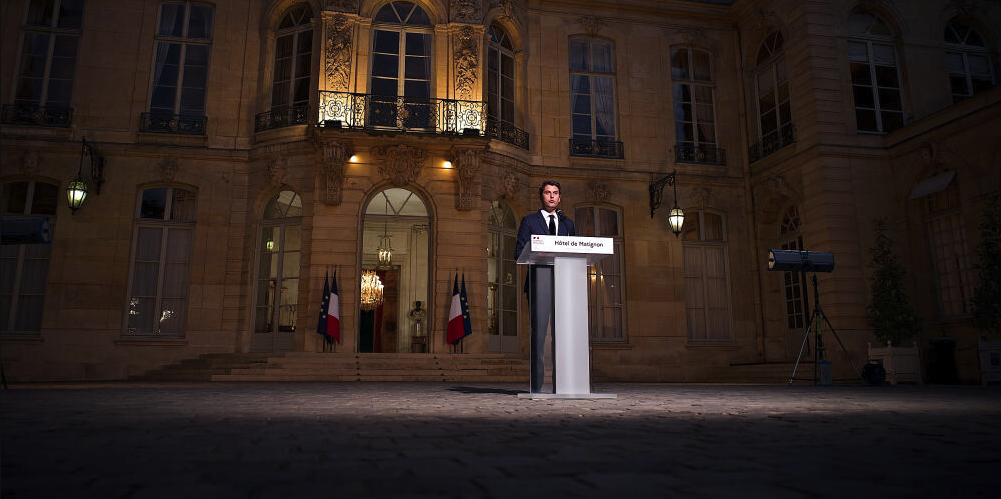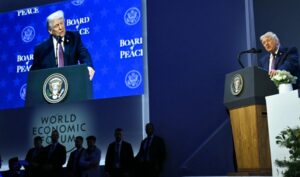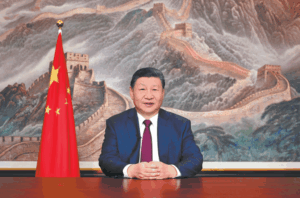
Published 06/30/2024 18:30 | Edited 06/30/2024 18:32
French voters gave the far-right National Rally (RN) a strong lead in the first round of legislative elections on Sunday (30), generating significant political uncertainty in the country, according to electoral projections. President Emmanuel Macron, who called the snap elections just three weeks ago, urged voters to mobilize against the radical right.
Polling agency projections suggest the RN has a good chance of winning a majority in the lower house of parliament for the first time, with around a third of the vote in the first round, almost double the 18% it won in the first round in 2022. The party is capitalizing on its success in the European elections, which prompted Macron to dissolve parliament and call the surprise vote.
Government strategy
In a significant strategic move, Prime Minister Gabriel Attal announced that the presidential candidates who came third in the French legislative elections will withdraw to block the advance of the far-right party, with a few exceptions. This gives left-wing candidates a better chance of making it to the second round against RN candidates.
The candidate withdrawal strategy aims to prevent the victory of RN, which, with its growing support, represents a considerable challenge for traditional parties. By removing candidates who came in third place, the presidential field hopes to concentrate votes on candidates from the New Popular Front (NFP), the left-wing front, increasing their chances of victory against the RN in the second round.
Gabriel Attal’s decision reflects the urgency and importance of forming a united front against the rise of the far right. This strategy of withdrawal is not new in French politics, having been used in past elections to prevent far-right victories. However, the effectiveness of this approach will depend on voter mobilization and the ability of center and left parties to unify their bases.
Furthermore, the high turnout suggests that the electorate is more engaged, possibly due to increasing polarization and the desire to prevent greater RN influence in parliament. The presence of 165 triangular and three quadrangular seats indicates fierce and unpredictable competition, which could result in a highly fragmented parliament.
Party performance
Projections showed the National Rally, led by Marine Le Pen and her protégé Jordan Bardella, securing first place with 33.2% of the national vote. The left-wing alliance of parties, the NFP, came in second with 28.1%. Macron’s alliance came in third with 21%. So far, of the 737 candidates who have qualified for the second round, 267 are from the RN-LR, 215 from the NFP, 158 from the Ensemble and 39 from the Republicans (LR).
Although the RN narrowly missed out on a majority of seats in parliament, there is a chance it could extend its lead and win a majority in a second round of elections on July 7. If that happens, Bardella, 28, could become the country’s first hard-right prime minister since World War II, replacing Macron’s pro-Europe, pro-business agenda with a populist, anti-immigration platform.
The second round will be decisive, raising big questions about how Macron will share power with a prime minister hostile to most of his policies. These early elections, which end on July 7, have the potential to affect European financial markets, Western support for Ukraine and the management of France’s nuclear arsenal and global military strength.
Voter motivation
Many French voters are frustrated by inflation and other economic problems, as well as Macron’s leadership, which they see as arrogant and out of touch. Marine Le Pen’s anti-immigration party has tapped into that discontent, particularly through online platforms like TikTok, topping pre-election opinion polls.
The New Popular Front also poses a challenge to Macron and his centrist alliance. Including socialists, communists, greens and the radical left, the coalition promises to reverse the unpopular pension reform that raised the retirement age to 64, among other economic reforms.
Electoral participation
There are 49.5 million registered voters who will choose the 577 members of the National Assembly, the influential lower house of the French parliament. To date, the French Ministry of the Interior has released results in 308 of the 577 constituencies. Of these, 26 candidates were elected in the first round, 21 from RN-Les Républicains (RN-LR), one from Ensemble and one from NFP.
Voter turnout was 65.8%, an exceptionally high rate, representing 26 percentage points more than in the last first round vote in 2022. Some researchers have suggested that the high turnout could moderate the result for RN, indicating that voters made an extra effort to vote for fear of a radical right victory.
Macron voted in Le Touquet, a seaside resort in northern France. Le Pen also voted in the north, her party’s stronghold, in the working-class town of Hennin-Beaumont. Voters in Paris have pondered issues such as immigration and the rising cost of living, with the country increasingly divided between radical right and radical left blocs, while a deeply unpopular and weakened president remains at the political center. The campaign was marked by an increase in hate speech.
International and political context
Macron called the early elections after his party lost the European Parliament election to the RN, which has historical ties to racism, anti-Semitism and hostility toward France’s Muslim community. The call was a bet that French voters would be encouraged to support moderate forces to keep the radical right out of power.
Support for the National Rally has spread far and wide. Bardella, who has no government experience, says he would use his powers as prime minister to stop Macron from continuing to supply Ukraine with long-range weapons. The RN also questions the right to citizenship for people born in France and wants to restrict the rights of French dual nationals, raising concerns about human rights and France’s democratic ideals.
Public spending promises from the RN and the left-wing coalition shook markets and raised concerns about France’s debt, criticized by the European Union. The election also impacts overseas territories such as New Caledonia, where recent violence and proposed changes to the French Constitution have generated tension.
Voters in other overseas territories, such as Saint-Pierre-et-Miquelon, Saint-Barthélemy, Saint-Martin, Guadeloupe, Martinique, Guyana and French Polynesia, cast their ballots on Saturday 29th. The results of the first round will give an idea of voters’ sentiment, but the final composition of the National Assembly will only be clear after the second round.
Source: vermelho.org.br

